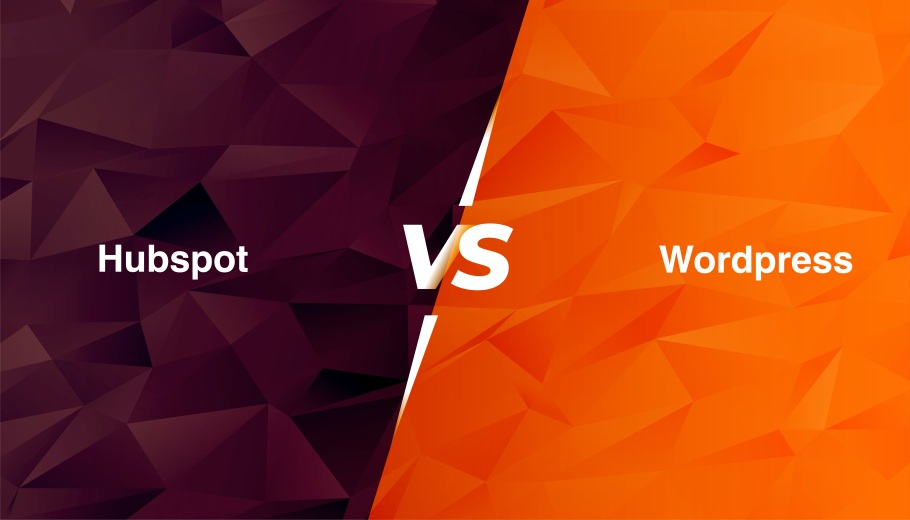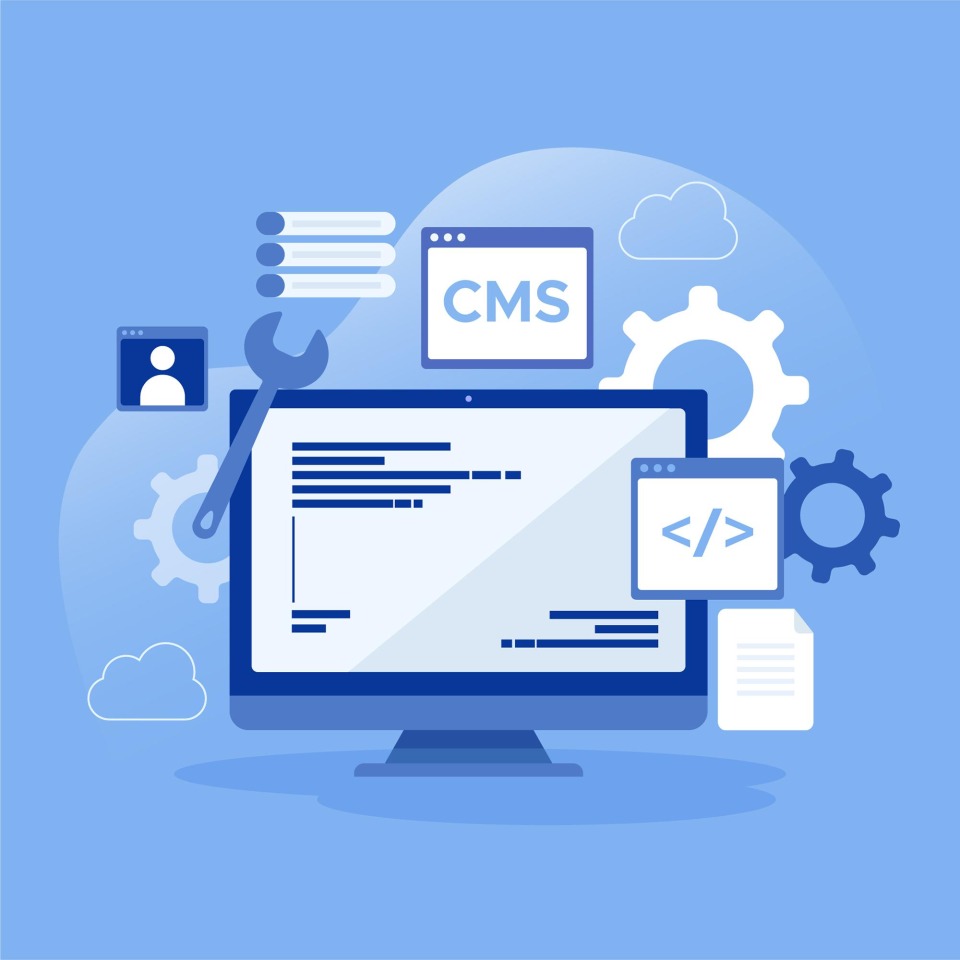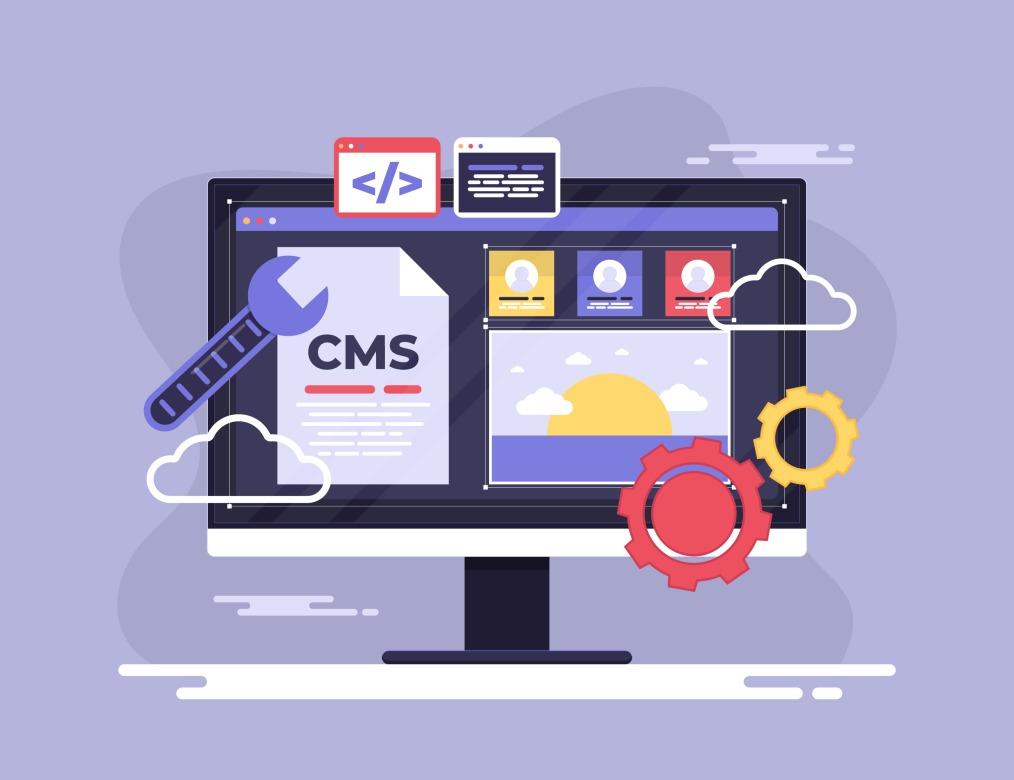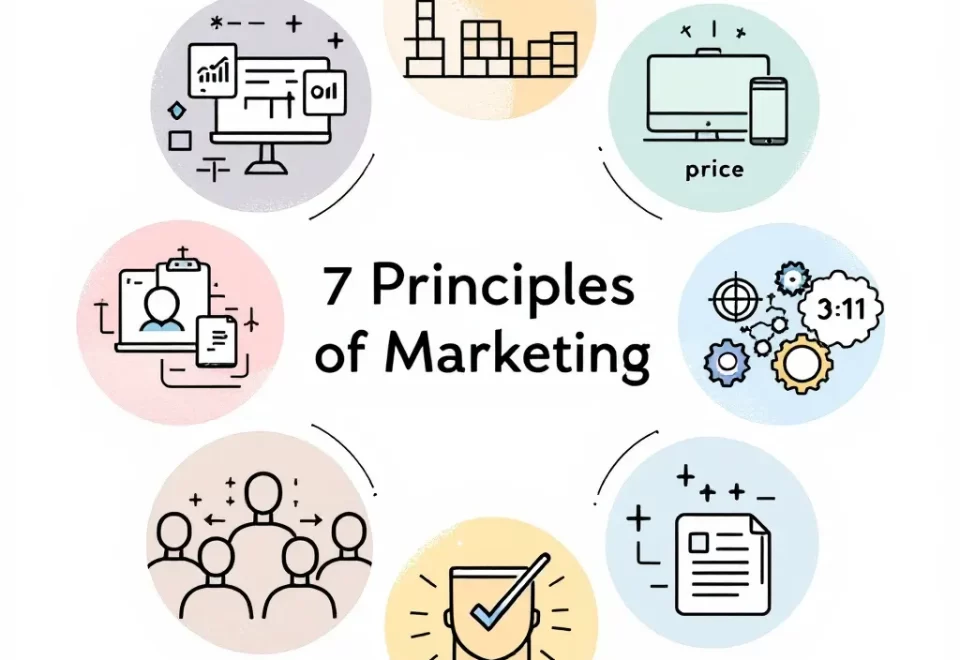As a business, you know how important it is to have a solid website. But with so many options out there, it can be hard to decide which Content Management System (CMS) is best for you.
A CMS allows you to create, edit, and organize your website’s content. Two of the most popular content management systems out there are HubSpot and WordPress. But which is right for your website builder?
Let’s compare the two platforms – HubSpot vs WordPress – so you can make an informed decision. We kick off the article with a brief introduction to the two CMS platforms.
HubSpot as a CMS and its Benefits
HubSpot CMS is an all-in-one customer relationship management (HubSpot CRM) platform that comes with an integrated website design and development tool. It’s designed to give businesses a comprehensive view of their customer relationships across every stage of their journey.
With its powerful marketing automation tools and analytics dashboard, businesses can track leads from acquisition to conversion and improve their customer engagement efforts.
Using HubSpot as your CMS has several key benefits that set it apart from other platforms. First off, its drag-and-drop functionality makes creating pages simple and fast. This means that businesses can create pages quickly without having to rely on coding or web designers.
Additionally, thanks to its integrated CRM, businesses can easily capture customer data and use it to personalize their interactions with customers throughout the customer journey. Also, the CMS Hub that HubSpot offers, delivers personalized experiences for engaging contacts.
Finally, with its powerful analytics capabilities, businesses can measure their marketing efforts across channels and optimize their campaigns for maximum success.
Now is the perfect time to get started with HubSpot as your CMS because it’s never been easier or more affordable than it is today. The company has recently launched new features that make creating websites faster and easier than ever before.
Additionally, they now offer low monthly plans that make getting started with their platform much more affordable than ever before—perfect for small businesses on tight budgets looking for a powerful website-building solution.
WordPress as a CMS and its Benefits
WordPress CMS is an open-source platform that enables you to build a website in a fraction of the time it would take with traditional tools and resources. This means that even if you have limited knowledge of web design or coding, you can still quickly create a stunning website for your business.
The primary benefit of using WordPress as a CMS is its flexibility. With WordPress, you have access to thousands of themes and plugins that allow you to customize your website exactly how you want it. Whether you’re looking for a simple blog or an eCommerce store, there’s something available in the WordPress site library to suit your needs.
The platform has been designed to support WordPress sites of all sizes and shapes so no matter what size your business grows into, your website will always be able to keep up with demand. Additionally, since WordPress is open-source software it’s constantly being improved on by developers around the world so new features are being added all the time.
Furthermore, there are no licensing fees associated with using a WordPress website which makes it much more affordable than other proprietary solutions. Additionally, there are plenty of free themes and plugins available so even if you don’t have money to invest in premium options, you can still create a great-looking website without breaking the bank.
Do you need help utilizing HubSpot and/or WordPress to build a website or blog?
Contact Growth Hackers
HubSpot vs WordPress – Comparing The Key Features
When it comes to comparing HubSpot and WordPress, there are several key features that you should consider before making a decision. Let’s take a look at them.
1. Ease of Use
HubSpot is renowned for its user-friendly design and intuitive drag-and-drop interface. The platform allows you to quickly create landing pages and blog posts, customize forms, and manage your contacts. If you get stuck, there’s plenty of support available in the form of tutorials, webinars, and even a live chat feature on their help page.
In addition, HubSpot offers an extensive library of templates in its HubSpot Marketplace to give you a head start with your web design. All these features make HubSpot extremely easy to use – especially if you’re just getting started with web design.
WordPress is known for being the most popular CMS on the market today – but it can be tricky for those new to web design. While WordPress does offer free themes that make it easier to get started with designing your website, they don’t have nearly as many customization options as HubSpot does for its templates. This means that it may take longer for beginners to set up their sites on WordPress than it would on HubSpot.
Additionally, while there are plenty of tutorials available online from third-party providers that can help guide users through the creation process – these aren’t always beginner-friendly as many assume an existing knowledge base about coding or other web development skills already exists to navigate them effectively.
2. SEO Services
When compared to other solutions like WordPress, HubSpot shines when it comes to SEO-related features. As a business user, you have access to many SEO tools without needing additional plugins or external sources. These include content optimization tools such as meta tags editor and keyword analysis, plus other features such as page redirects management and sitemap creation tools.
Additionally, HubSpot automatically adds structured data fields to pages which helps search engine crawlers better understand the content on your website. This can result in improved rankings for specific queries related to your products or services.
When using WordPress, the right WordPress plugin (such as Yoast) will let you create custom titles and meta descriptions per page/post while also controlling what content appears in each page’s HTML source code (i.e., headings). Additionally, WordPress offers a wide range of customization options when it comes to optimizing URLs which can help improve your ranking in the search engines.
It also allows you to integrate Google Analytics into your site for tracking purposes quite easily – something that cannot be said about HubSpot out of the box.
3. Security
When it comes to HubSpot, its built-in security features provide a great deal of protection for businesses looking for an all-in-one solution. Its servers are located in secure data centers with multiple layers of defense, including firewalls and encryption technologies like SSL/TLS. Furthermore, HubSpot uses advanced monitoring tools like intrusion detection systems (IDS) to detect any suspicious activity before it can cause damage.
Additionally, HubSpot has implemented stringent user authentication protocols such as 2FA and password requirements that meet current industry standards. All in all, HubSpot provides comprehensive security features designed to keep your website safe from potential threats.
WordPress also provides solid security features such as automatic updates, malware detection & removal tools, and SSL certificates to ensure your data is kept safe at all times. Additionally, WordPress offers a variety of free and premium plugins that can be used to further enhance your site’s security by adding additional layers of protection against malicious attacks.
While these plugins do require some maintenance and upkeep on your part (i.e., you need to install plugins and ensure they are regularly updated), they are still an effective way to keep your WordPress site secure and protected from malicious attacks.
4. Blogging Platform
HubSpot is designed specifically for businesses, so it comes as no surprise that it offers some great blogging features. For starters, the drag-and-drop editor makes it easy to customize any page on your website, including blog posts. You can also add images and videos with ease, making sure your posts are engaging and visually appealing.
One of the great things about HubSpot is that it gives you access to SEO tools and analytics, so you can track how well your post is performing. And if that wasn’t enough, HubSpot also integrates with other marketing tools such as email marketing campaigns and social media platforms.
WordPress includes an easy-to-use visual editor that allows you to customize blog posts just like HubSpot does – plus, there are thousands of themes available that allow you to give your website a unique look and feel. WordPress also has plenty of plugins available that extend its functionality – this means that if there are specific features you need for your blog, chances are they’re already available or can be easily added in via a plugin.
Finally, WordPress has built-in search engine optimization tools so you can track how well your post is doing in terms of organic traffic from search engine results pages (SERPs).
5. Flexibility & Ownership
In terms of flexibility, both WordPress and HubSpot offer plenty of options when it comes to customizing your website’s design and functionality. With HubSpot, however, you get more control over certain aspects such as fonts, colors, images, page layouts, and more since it has an in-depth drag-and-drop editor built into its CMS.
On the other hand, with WordPress, you have more freedom to customize the coding itself if you choose to do so – which could be beneficial if you’re looking for something unique or complex that isn’t available through pre-built tools or plugins.
When it comes to ownership and hosting costs, HubSpot’s CMS offers a single monthly subscription fee which includes hosting as well as all of their services (including support). This makes it easier for businesses on a budget since they don’t have to worry about paying extra fees for hosting or maintenance on top of their subscription fee.
On the other hand, with WordPress businesses will need to pay for hosting separately from any plugins or themes they purchase – but this does give them full control over their website which can be beneficial in certain scenarios.
6. Support & Community
HubSpot offers a wide range of support services. If you have any questions or need help with anything related to your website, you can reach out to their team via email, chat, or phone. The platform also offers a comprehensive library of resources like tutorial videos and self-help articles that are easily accessible from within the platform.
Additionally, they offer an active forum where users can ask questions, get advice from peers, and even share custom code snippets. All in all, HubSpot provides plenty of online resources for users who need help using their CMS.
WordPress has an active user community that offers plenty of helpful resources for people building websites with the platform. There are plenty of online tutorials available that will teach you how to use WordPress – from setting up a hosting account to creating custom themes and plugins.
Additionally, there’s an extensive library of user-created plugins and themes available for free on the official WordPress repository as well as premium services offered by third-party developers. Finally, if you ever get stuck on something while using WordPress, there are numerous forums dedicated to helping people troubleshoot issues with the CMS.
7. Marketing Automation
Both Content Management Systems offer powerful marketing automation tools which allow users to set up automated campaigns across multiple channels (such as email or social media) based on user behavior or other criteria like customer segmentation.
One advantage that HubSpot has here is its easy integration with other products like Salesforce or MailChimp so users can access all their data in one place without having to manually transfer information between different accounts or systems.
However, with WordPress, there are plenty of third-party integrations available through plugins so users still have plenty of options when it comes to automating tasks related to marketing campaigns.
Let’s power up your website and marketing efforts with HubSpot or WordPress today!
8. Design & Layout
One of the biggest differences between HubSpot and WordPress is the design options available. With WordPress, you can choose from thousands of templates that range from basic layouts to more complex designs with custom features and WordPress themes.
You also have more control over how your site looks; you can customize every aspect of your layout, including fonts, colors, images, and more. However, this also means that you need to be comfortable with coding if you want to get the most out of WordPress.
HubSpot is much easier to use in terms of design; it offers fewer templates than WordPress but still plenty for most users’ needs. It also comes with built-in tools for editing text and images without needing any coding skills—great for those who don’t want to mess around in HTML or CSS. On top of that, HubSpot also offers an easy-to-use drag-and-drop editor for creating landing pages quickly and easily.
9. Customization
WordPress offers much more flexibility when it comes to customization options; there are thousands of plugins available that allow users to add almost any feature imaginable to their site.
This includes everything from contact forms to shopping carts, SEO tools, analytics tracking tools, social media integration, and much more. Most plugins are free or low-cost, so they can be a great way to add features without breaking the bank.
HubSpot has fewer customization options than WordPress; however, it does come with a variety of useful features such as integrated email marketing tools, analytics tracking tools, customer relationship management (CRM) integrations, A/B testing capabilities, and more—all included at no extra cost.
It’s worth noting that these features are only available on higher-tier plans; however, they can be worth the investment if you plan on using them regularly.
10. Analytics & Reporting
When it comes to analytics and reporting, one of the main advantages that HubSpot offers over WordPress is its built-in insights. This feature allows businesses to see exactly how their website is performing by measuring things like page views, number of leads generated, bounce rate, etc. It can also be used to segment audiences for targeted outreach campaigns based on their behavior on the site.
Additionally, HubSpot’s reporting feature allows users to easily create custom reports with data from any source and export them into a variety of formats. These reports can be used for internal analysis or shared externally with stakeholders or partners.
WordPress has some embedded analytics capabilities, such as its Site Stats tool which allows users to view basic metrics like pageviews and unique visitors over time. However, if you want more detailed information about user behavior on your site then you need to install a plugin like Google Analytics or Jetpack.
These plugins provide more comprehensive insights into user behavior such as which pages are most popular, what keywords people are using to find your site, etc. If you want even more detailed information then you can set up custom report templates using these plugins that allow you to track different types of data points over time (e.g., sales conversions).
Final Thoughts on HubSpot vs WordPress – Which CMS Do You Need For Your Website Builder?
Whether you choose HubSpot or WordPress depends on your business goals; both have advantages when it comes to creating an effective website builder solution for businesses big and small alike.
If you need advanced marketing automation capabilities such as email campaigns and CRMs, then HubSpot might be right up your alley; however, if you want flexibility when it comes to design customization as well as SEO optimization, then WordPress could be the way to go.
Ultimately it all comes down to what works best for your particular situation – but no matter which path you take, your website will benefit. And speaking of benefits, if you want some professional help setting up your digital marketing strategies for your website, look no further than Growth Hackers. We’re recognized as not only one of the top web design companies, but also as an agency focus on data, growth and measurable results.
Here at Growth Hackers, we understand the importance of utilizing data-driven insights to fuel your website’s growth and improve its ROI. We know that a comprehensive approach is key to sustainable growth, which is why our team combines their expert market analysis with an in-depth review of your real-time and historical data.
With our help, you can ensure that your digital marketing strategy is as effective and efficient as possible. Plus, by leveraging every opportunity for conversion optimization, you can also be assured that all of your efforts are directed toward increasing profits and achieving greater success.
So, whether you’re looking to start from scratch or want to give your current website a boost, contact Growth Hackers today and let us use our knowledge to craft an effective digital marketing strategy tailored specifically to your needs.








